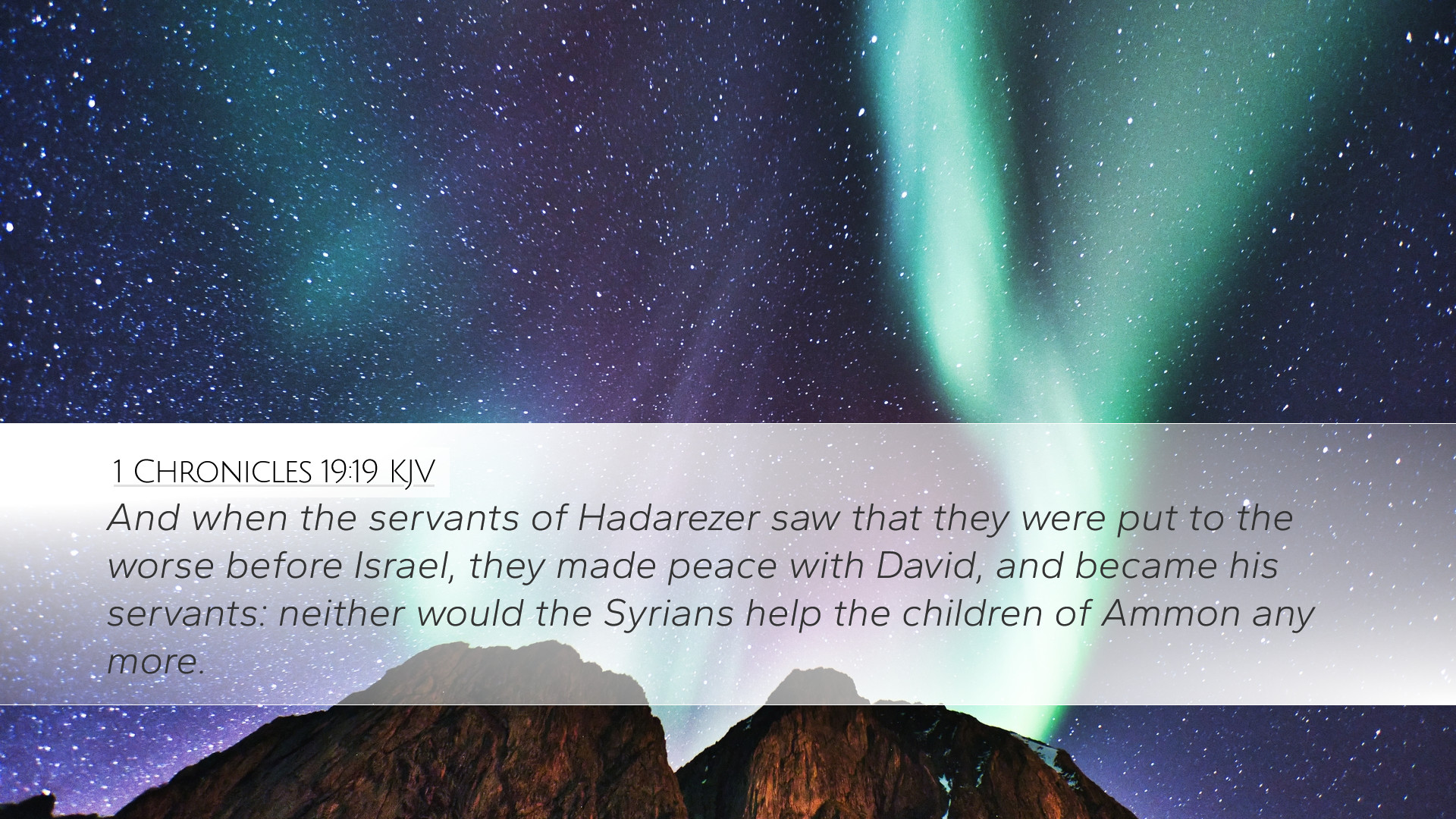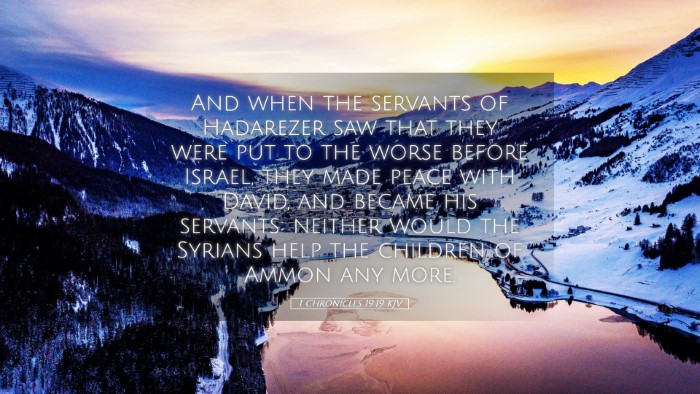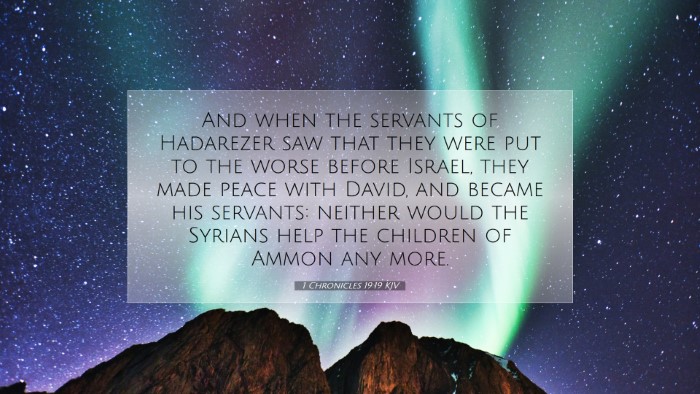Commentary on 1 Chronicles 19:19
1 Chronicles 19:19 states: "But when the children of Ammon saw that their allies were fleeing, they also fled before Abishai, and entered the city. So Joab returned from fighting against the children of Ammon and came to Jerusalem." This verse marks a pivotal moment in the military conflict between Israel and the Ammonites, emphasizing themes of alliance, betrayal, and divine sovereignty that are pervasive throughout the Scriptures.
Introduction
This commentary synthesizes insights from several public domain sources, including Matthew Henry, Albert Barnes, and Adam Clarke. The exploration of 1 Chronicles 19:19 is crucial in understanding the broader historical context and spiritual implications observed in the narrative of David's reign and the conflicts involving Israel.
Historical Context
The conflict detailed in 1 Chronicles arises in the backdrop of David's kingship and the continued opposition of neighboring nations, notably the Ammonites. Following the death of King Nahash of Ammon, David sought to express kindness to the new king, Hanun. Misinterpreting this gesture as espionage led to hostilities, where Ammon, supported by the Arameans, provoked a military response from Israel.
Military Maneuvers
- Abishai's Command: Abishai, David's valiant nephew, led the troops and represented the loyalty and military prowess of David's commanders.
- Joab's Leadership: Joab, his brother, was embroiled in the conflict, commanding the larger forces of Israel. His strategic importance is highlighted when he withdrew forces upon witnessing the retreat of the Ammonites.
Theological Reflections
This passage imparts several theological reflections that resonate with pastoral, scholarly, and theological audiences:
Divine Sovereignty
Throughout the biblical narrative, God's sovereignty is a recurring theme. The fleeing of the Ammonites may reflect God's hand in securing victory for Israel despite military might appearing insurmountable:
- Declaring Judgment: The loss faced by the Ammonites signifies a divine judgment against their wickedness and revelation of God's power over national pride.
- Protection of His People: The outcome showcases God's protective nature over Israel, reassuring believers of His commitment and presence in their struggles.
Alliances and Betrayals
The alliances drawn by the Ammonites reflect human tendencies towards both reliance on earthly strength and the treachery that permeates such relationships:
- Fleeting Alliances: The rapid withdrawal of the Ammonite troops underscores the fragility of alliances made without trust in God's providence.
- Consequences of Miscommunication: The Ammonites' misunderstanding of David’s intentions precipitated a disastrous conflict, illustrating the consequences of miscommunication and suspicion.
Commentary Insights
Matthew Henry's Perspective
Matthew Henry emphasizes the role of divine providence in the affairs of nations. He notes:
"God can make those who oppose His cause to be their own destroyers."
This highlights the notion that God's will ultimately prevails over human scheming and that the pride of enemies can lead to their own downfall.
Albert Barnes' Observations
Albert Barnes provides insight into the military strategies employed:
"Joab's return signifies a tactical retreat but also a victorious resolution."
He articulates that Joab's decision to pull back was strategic and inversely reflected the chaos and disarray within the Ammonite ranks.
Adam Clarke's Analysis
Adam Clarke adds depth regarding the motivations behind the Ammonites’ actions:
"Fear often causes men of valor to flee when they see the tide of fortune turning against them."
Clarke's commentary reflects on the psychological aspects of warfare, shedding light on human behavior under duress.
Practical Applications
The narrative encapsulated in 1 Chronicles 19:19 provides significant lessons for contemporary believers:
Insights for Pastoral Ministry
- Encouragement in Conflict: Pastors can draw strength from this narrative, teaching their congregations that God remains sovereign even in dire circumstances, urging them to trust in His leadership.
- Importance of Communication: Ensuring clear communication within communities can prevent misunderstandings that lead to conflict.
Insights for Theological Study
- Exploration of Divine Will: The passage invites deeper study of how God orchestrates events in history, encouraging scholars to explore divine sovereignty across biblical narratives.
- Alliances and Their Implications: The interactions between Israel and other nations offer a lens through which scholars may evaluate human relationships and the theological implications of alliances.
Conclusion
1 Chronicles 19:19 offers rich theological insights into themes of conflict, divine sovereignty, and the fragility of human alliances. As believers reflect upon this verse, they attain a greater understanding of God's providence and the assurance that His will prevails amidst chaos. For pastors, students, and scholars, this passage serves as a foundation for teaching and reflection, encouraging a deepened faith in God's overarching plan.


